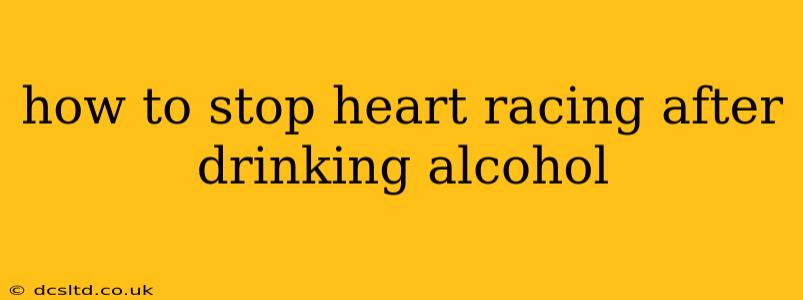A racing heart after drinking alcohol, also known as alcohol-induced tachycardia, is a common experience. While usually harmless and temporary, it can be alarming. This comprehensive guide explores the causes, effective remedies, and when to seek professional medical attention.
Why Does My Heart Race After Drinking Alcohol?
Alcohol's effect on the heart is multifaceted. It acts as a central nervous system depressant, initially relaxing you, but it can also interfere with the heart's natural rhythm. Here's a breakdown:
- Increased Heart Rate: Alcohol directly affects the sinoatrial (SA) node, the heart's natural pacemaker. This interference can lead to an increased heart rate, causing palpitations or a racing sensation.
- Dehydration: Alcohol is a diuretic, meaning it increases urination and can lead to dehydration. Dehydration can, in turn, affect your blood volume and electrolyte balance, contributing to an irregular heartbeat.
- Electrolyte Imbalance: Alcohol consumption can disrupt the balance of electrolytes like potassium and magnesium, which are crucial for proper heart function. Imbalances can trigger heart palpitations or arrhythmias.
- Underlying Heart Conditions: In some individuals, alcohol can exacerbate pre-existing heart conditions, making heart racing more pronounced and potentially dangerous. This is why it's crucial to understand your own health history.
- Alcohol Withdrawal: In individuals with alcohol dependence, even moderate alcohol consumption can trigger withdrawal symptoms including a rapid heartbeat.
How to Slow Down a Racing Heart After Drinking
Several strategies can help manage a racing heart after alcohol consumption:
- Hydration: Drink plenty of water or electrolyte-rich drinks to rehydrate your body and restore electrolyte balance. Avoid sugary drinks as they can further dehydrate you.
- Rest and Relaxation: Find a quiet, comfortable place to rest. Deep breathing exercises can help calm your nervous system and slow your heart rate. Consider techniques like box breathing (inhale for 4, hold for 4, exhale for 4, hold for 4).
- Avoid Caffeine and Nicotine: These stimulants can further increase your heart rate and worsen the situation. Avoid coffee, tea, and smoking.
- Avoid Intense Physical Activity: While exercise is generally beneficial, strenuous activity can exacerbate a racing heart. Opt for gentle activities like a slow walk if you feel up to it.
- Over-the-Counter Medications: In some cases, over-the-counter pain relievers like ibuprofen or acetaminophen might help alleviate any associated discomfort. Always consult a doctor or pharmacist before taking any medication.
- Time: Often, the racing heart will subside naturally as your body processes the alcohol. Allow yourself time to recover.
What if My Heart Racing Doesn't Stop?
While occasional heart racing after drinking is usually benign, persistent or severe symptoms warrant immediate medical attention. Seek professional help if you experience:
- Severe chest pain: This could indicate a more serious heart problem.
- Shortness of breath: Difficulty breathing alongside a racing heart is a cause for concern.
- Dizziness or lightheadedness: These symptoms may indicate low blood pressure or other complications.
- Fainting: Loss of consciousness requires immediate medical attention.
- Persistent, rapid heartbeat: If your heart rate remains abnormally high for an extended period, seek medical help.
How Long Does It Take for Alcohol to Leave Your System?
The time it takes for alcohol to leave your system depends on various factors, including your weight, metabolism, gender, and the amount of alcohol consumed. While there's no exact timeframe, it generally takes several hours to metabolize a standard drink. However, the effects on your heart rate can persist longer.
Can Alcohol Cause Permanent Heart Damage?
Chronic, excessive alcohol consumption can significantly damage the heart, leading to conditions like alcoholic cardiomyopathy (weakening of the heart muscle) and arrhythmias. Moderate drinking, however, is generally not associated with long-term heart damage for most people.
What are the Long-Term Effects of Heavy Drinking on the Heart?
Heavy, long-term alcohol abuse can lead to serious and potentially irreversible damage to the heart, including:
- Cardiomyopathy: Weakening and enlargement of the heart muscle.
- Arrhythmias: Irregular heartbeats, potentially fatal.
- High blood pressure: Chronic hypertension increases the risk of heart attack and stroke.
- Stroke: Alcohol misuse elevates the risk of stroke.
- Heart failure: In severe cases, alcohol abuse can lead to heart failure.
This information is for general knowledge and does not constitute medical advice. Always consult a healthcare professional for any health concerns or before making any decisions related to your health or treatment.
